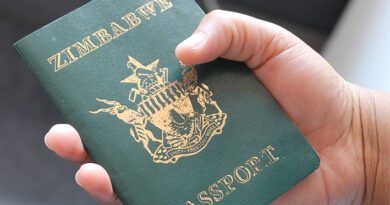SA High Court Halts Operation Dudula’s Unlawful Actions Against Foreign Nationals
Johannesburg – The High Court has ruled as “unlawful” the actions of Zandile Dabula and her Operation Dudula aimed at restricting foreign nationals from accessing state hospitals, clinics, and schools in South Africa.
In the judgment on Tuesday, 4 November 2025, Judge LR Adams ruled: “The first respondent [Operation Dudula], the eleventh [Zandile Dabula] and twelfth [Dan Radebe] respondents be and are hereby interdicted and restrained from demanding that any private person produce her/his passport or other identity documents to demonstrate her/his right to be in the Republic”.
The court ruled that only immigration officials and police officers have the power to demand identification from persons.
The judgment was in response to an application by voluntary associations for interdictory and declaratory relief against Operation Dudula and against the government of South Africa.
The case on behalf of the applicants, in a nutshell, is that Operation Dudula and its members have, on a constant and continuous basis, acted unlawfully and in breach of the Constitution.
Such conduct is alleged to include:
intimidation, harassment, and assault of certain individuals, notably foreigners;
the making of public statements that constitute hate speech;
wearing apparel that closely resembles the official uniforms of the security forces;
interfering with public access to and the public’s right to access health care services;
interfering with access to, or the operations of, schools or harassing learners, teachers or parents;
unlawfully evicting people from their homes; and unlawfully removing informal traders from their stalls or interfering with the employment of persons in shops and businesses.
The applicants had sought an order inter alia compelling the government to take reasonable and effective steps to implement its National Action Plan to Combat Racism, Racial Discrimination, Xenophobia and Related Intolerance (‘the National Action Plan’).
As against the SA Police Service (SAPS), the applicants sought relief requiring it to fulfil its constitutional obligations to prevent, combat and investigate criminal conduct, as well as interdictory relief against both the SAPS and the Department of Home Affairs to prevent them from colluding with or supporting Operation Dudula.
Judge Adams noted that the rights to privacy and dignity in the Constitution attach to ‘everyone’ and not just to citizens.
“Human dignity has no nationality,” the judge stated.
“The fact that an individual is a non-citizen or undocumented does not mean that her/his basic human rights can be violated without consequences.
“That flies in the face of the founding provisions and values of our constitution.”
The judge noted that Operation Dudula respondents failed to deliver notice of intention to oppose and the application for interdictory and declaratory relief sought against them was unopposed.
As regards actual harm, the court found undisputed evidence reveals a clear pattern of unlawful acts perpetrated by Operation Dudula, its public representatives, and its members, including incitement of violence and hate speech.
“It has engaged in the incitement of violence, the propagation of hate speech and other unlawful conduct both at gatherings and on its social media platforms,” the order stated..
“This is in clear contravention of section 8(6) of the Regulation of Gatherings Act 205 of 1993 (Gatherings Act).
“Section 10 of the Promotion of Equality and Prevention of Unfair Discrimination Act 4 of 2000 (Equality Act) further prohibits speech that incites harm on grounds that include nationality, social origin, race, and ethnicity.”
Order issued by Judge LR Adams included the following:
(1) It be and is hereby declared that only an immigration officer or a police officer has the power in terms of section 41 of the Immigration Act 13 of 2002 to demand that another private person produce her / his passport or other identity documents to demonstrate her / his right to be in the Republic of South Africa and that no private person has the power to do so unless expressly so authorised by law.
(2) The first respondent, the eleventh and twelfth respondents be and are hereby interdicted and restrained from demanding that any private person produce her / his passport or other identity documents to demonstrate her / his right to be in the Republic.
(3) The first respondent, the eleventh and the twelfth respondents be and are hereby interdicted and restrained from:
(a) Intimidating, harassing, and/or assaulting any individuals that they identify as being foreign nationals;
(b) Making public statements that constitute hate speech on the grounds of nationality, social origin, or ethnicity at public gatherings, on social media platforms, or in any other way;
(c) Interfering with the access of foreign nationals to health care services and/or their right to such access;
(d) Interfering with access to, or the operations of, schools and intimidating or harassing learners, teachers, or parents at schools;
(e) Unlawfully evicting foreign nationals from their homes;
(f) Unlawfully removing foreign nationals from their trading stalls or interfering with the employment of foreign nationals in shops and businesses;
(g) Instigating, encouraging, or inciting any other person to perform any of the acts prohibited by this order, on social media, at gatherings in terms of the Regulation of Gatherings Act 205 of 1993, or in any other way;
(4) The first respondent be and is hereby ordered and directed to communicate this order to any and/or all of its office-bearers and members.
(5) The second respondent be and is hereby directed and ordered to take reasonable steps to implement the National Action Plan to Combat Racism, Racial Discrimination, Xenophobia and Related Intolerance, including by: –
(a) taking steps to establish an early warning and rapid response mechanism regarding threats of xenophobic hate speech and hate crimes;
(b) collating and publishing disaggregated data in respect of xenophobic hate speech and hate crimes, including the prosecution and conviction of persons who commit such offences.
(6) It be and is hereby declared that, on a proper interpretation of section 41 of Immigration Act 13 of 2002, the powers conferred on an immigration officer or police officer:
(a) are confined to public places and do not authorise warrantless searches in private places that include the home and places of study, work, or business;
(b) require that an immigration officer or police officer hold a reasonable suspicion that a person is unlawfully in South Africa in order to request them to identify themselves as a citizen, permanent resident, or foreigner; and
(c) do not permit the interrogation, arrest, and detention of children under the age of 18, except as a measure of last resort and in a manner that is consistent with section 28(1)(g) of the Constitution.
(7) The first, second, third, fourth, sixth, eleventh and twelfth respondents, jointly and severally, the one paying the other to be absolved, shall pay the applicants costs of their opposed Special Motion, such cost to include the costs of three Counsel, where so employed, and in regard to Counsel’s costs incurred after 12 April 2024, same shall be on scale ‘C’ of the tariff applicable in terms of Uniform Rule of Court 67A.




